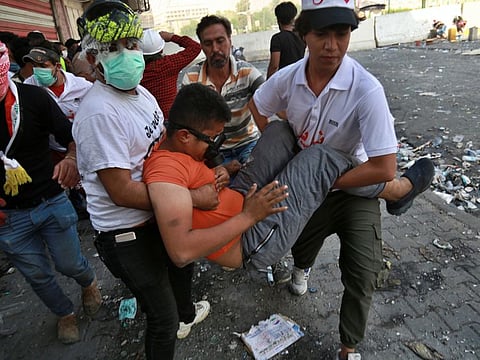Iraqis need reforms, not repression
Iraq, with all of its resources, should be a vibrant and prosperous country

Mass rallies calling for an overhaul of the ruling system have rocked the Iraqi capital of Baghdad and the Shiite-majority south since October 1.
Hundreds have died in the violence, but political forces closed ranks this week to defend the government and the consensus among the Iraqi elite seems to have paved the way for a crackdown. Three protesters were shot dead in the southern city of Nasiriyah on Sunday, while dozens of demonstrators were wounded in Baghdad.
Despite the violence, demonstrators tried to regroup on Sunday in Baghdad’s main protest camp at Tahrir Square, while hundreds of others dug in at the nearby Khallani square.
In the first official toll in days, parliament’s human rights committee said 319 people had been killed since the protests first erupted, including demonstrators and security forces. The committee said snipers were active near protest sites and hunting rifles were used against demonstrators as well.
It is beyond reprehensible that the legitimate demands of the Iraqi people are being met with such savage violence. They are only asking for their basic rights and that their government must put their concerns above those of foreign powersGulf News
Warning that a “climate of fear has set in”, the United Nations mission in Iraq proposed a series of steps to end the crisis. It called for “maximum restraint in the handling of the protests, including no use of live ammunition, banning the improper use of non-lethal devices (such as tear gas canisters)”.
Adding to those calls, the White House released a statement on Sunday urging “the Iraqi government to halt the violence against protesters and fulfil President (Barham) Saleh’s promise to pass electoral reform and hold early elections”.
Any further crackdown on protesters will be met with heavy international criticism and will potentially lead the country into a devastating and bloody conflict that could easily spiral into a civil war.
It is beyond reprehensible that the legitimate demands of the Iraqi people are being met with such savage violence. They are only asking for their basic rights and that their government must put their concerns above those of foreign powers.
Oil-rich Iraq is Opec’s second biggest producer, but one in five persons lives in poverty and youth unemployment stands at 25 per cent, the World Bank says. These statistics are simply inexplicable.
While the Iraqi people are desperate for change, the government has done practically nothing to address their concerns. Iraq, with all its resources, should be a vibrant and prosperous country. The Iraqi people deserve better.



